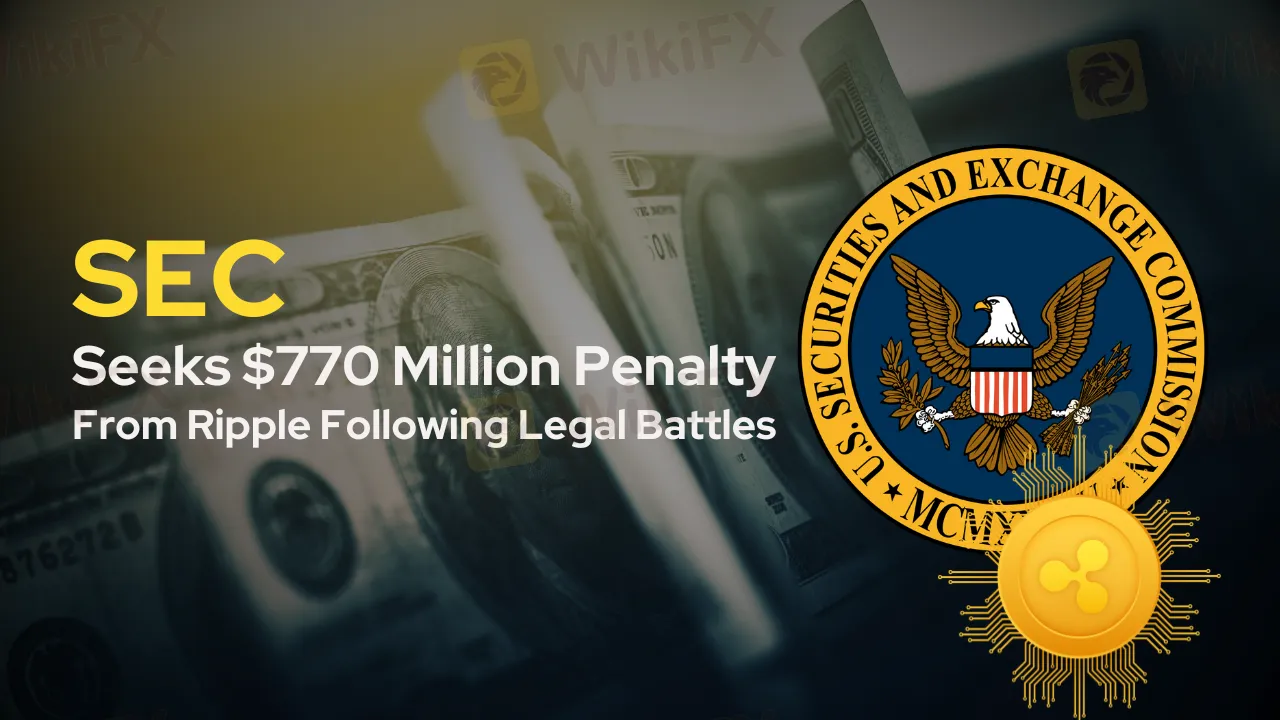简体中文
繁體中文
English
Pусский
日本語
ภาษาไทย
Tiếng Việt
Bahasa Indonesia
Español
हिन्दी
Filippiiniläinen
Français
Deutsch
Português
Türkçe
한국어
العربية
SEC Seeks $770 Million Penalty From Ripple Following Legal Battles
Abstract:SEC pursues a $770M penalty from Ripple after multiple legal challenges. Crypto attorney, John Deaton, provides insights on the SEC's motivation and predicts the lengthy process ahead. The outcome of SEC's lawsuit against Coinbase may influence Ripple's situation. The overarching issue revolves around crypto regulations and the sale of unregistered securities in the evolving landscape of digital currencies.

The U.S. Securities and Exchange Commission (SEC) is reportedly demanding Ripple to pay a hefty penalty of $770 million for alleged violations of securities laws. This news comes after the SEC faced a series of legal setbacks against the cryptocurrency company.
Prominent crypto attorney, John Deaton, recently shared insights about the SEC's actions on a social media platform. He conveyed that the SEC's recent moves could be attributed to the embarrassment and frustration it feels after its previous legal missteps against Ripple. Just last week, the SEC decided to drop charges against Brad Garlinghouse, Ripple's CEO, and Chris Larsen, its co-founder. This decision followed a rejection by District Judge Analisa Torres of the SEC's appeal concerning XRP earlier in the month.
Deaton voiced his perspective candidly, stating, “The SEC is pissed and embarrassed and wants $770M worth of flesh.” He went on to explain that the process of determining the penalty involves a series of lengthy procedures, likening it to a “second case.” This involves more depositions, the production of various documents, emails, and bank statements, and a comprehensive review of on-demand liquidity (ODL) transactions. He predicts that a final judgment by Judge Torres might not be seen until late summer, and even then, the appeal process could stretch the case out for another year.

Drawing parallels, Deaton mentioned the case against LBRY, a blockchain-powered file-sharing platform. Initially, the SEC aimed for a $23 million penalty, but after eight months of litigation, the fine was ultimately set at just $130,000. This precedent, he believes, might hint at a possible reduction in the penalty that Ripple faces.
Another factor that could influence Ripple's situation is the outcome of the SEC's lawsuit against the renowned cryptocurrency exchange, Coinbase. Deaton believes that if Coinbase succeeds in dismissing the SEC's lawsuit, the SEC might reconsider its stance and potentially settle with Ripple. However, if the opposite occurs, and Coinbase's motion to dismiss fails, a settlement seems unlikely.
With the “oral argument on the Coinbase motion” scheduled for January 17, 2024, a decision is expected within the subsequent 60-120 days. Deaton predicts that during this waiting period, Ripple may end up spending tens of millions in legal fees in an effort to substantially reduce the $770 million penalty.
Highlighting the nature of the case, Deaton emphasized, “This isnt a fraud case.” He believes the objective is to determine a suitable penalty for Ripple, which engaged in sales that are viewed as unregistered securities. However, this is set against the backdrop of a complex regulatory environment, where other federal agencies have labeled such assets as 'virtual currencies.'
It remains to be seen how this legal tussle between the SEC and Ripple unfolds, but it's evident that the landscape of crypto regulations and penalties is still being mapped out, with significant implications for the industry's future.

Disclaimer:
The views in this article only represent the author's personal views, and do not constitute investment advice on this platform. This platform does not guarantee the accuracy, completeness and timeliness of the information in the article, and will not be liable for any loss caused by the use of or reliance on the information in the article.
Read more

Reasons Why You Can't Trust UbitMarkets for Forex Investments
UbitMarkets is one more forex broker that scams investors under the guise of high returns. Check out our exposure story.

Tough UK Crypto Rules Drive Institutional Clients Offshore
UK crypto regulations are driving institutional clients to operate through offshore entities in friendlier jurisdictions.

Gold Prices Fall by INR 39,300 in the Last Week? What's Next Week's Outlook?
The past week saw gold prices falling by as much as INR 39,300 per 100 grams across 24 Karat. Read the outlook for gold prices in India for the next week.

Webull Resumes Crypto Trading, Eyes Global Expansion Starting with Brazil
Webull re-enters the crypto market, launching services in Brazil with a Coinbase partnership. Plans for US rollout signal broader industry trends and renewed digital asset access for users.
WikiFX Broker
Latest News
The Dollar Keeps Falling: How Should We View Exchange Rate Volatility?
Asia-Pacific markets mostly rise as investors parse a slew of data releases
Asia-Pacific markets rise as investors parse a slew of data releases
WikiFX Gala Night Malaysia Concludes Successfully
IG Group Unlocks Over £425 Million amid a Capital Reduction
Gold Prices Fall by INR 39,300 in the Last Week? What's Next Week's Outlook?
European stocks open slightly higher as UK-U.S. trade deal cuts autos, aviation tariffs
Treasury yields tick lower as Trump's spending bill in focus
European stocks mixed as UK-U.S. trade deal cuts autos, aviation tariffs
Ripple and SEC Drop Appeals, Bringing 5-Year Legal Saga to a Close
Currency Calculator


